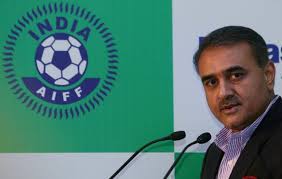By Samindra Kunti
November 9 – The All India Football Federation (AIFF) and its sidelined president Praful Patel (pictured) have challenged the Delhi High Court’s ruling that deemed Patel’s presidential elections invalid and taken the case to the Supreme Court with an appeal.
It took Patel and his Federation little time to appeal the decision from the Delhi High Court, which came as a shock to the AIFF president, who has reigned over Indian football for a decade. Earlier this week the Delhi High Court had ‘set aside’ the election of Patel for a third term over election irregularities and nominated SY Quraishi as interim administrator to ensure new elections within five months.
“The high court had set aside the election of the AIFF committee,” the AIFF counsel told the bench. “We are seeking a stay on it. Under the FIFA rules, a country is recognised only if there is an elected body and if there is no elected body, a country is derecognised by FIFA.”
Delhi’s High Court also established that the AIFF shouldn’t make any further new financial commitments, except with the administrator’s approval, until new elections in compliance with India’s National Sports Code have been held. The ruling will gravely impact, if not wreck, the AIFF’s bid for the 2019 U-20 World Cup. Last month India staged the U-17 World Cup, its first major football tournament.
Patel was invited to sit in on the session of the FIFA Council in Kolkata, which allowed him to pitch India as a football nation on the rise. Those plans may now be in tatters as the court order detailed the reasons for the bench to rule against Patel.
The petitioner Rahul Mehra raised the AIFF’s citing of Article 27(1) of the FIFA constitution, which requires candidates for the presidency and other office-bearers to have the support of at least five member associations. The court upheld Mehra’s argument, stressing the article was not applicable to a national football association and was “not in consonance with [India’s] National Sports Code.”
The Delhi High Court went by precedents from other Indian sports federations, including cricket, that had breached the National Sports Code. In Patel’s third election plenty of transgressions, ranging from issuing notices for elections, appointment of returning officers, filing of nominations and not providing candidates adequate time for canvassing, may have occurred. The court order lists all of the AIFF and Patel’s potential infringements.
The presidential elections were held on 21 December 2016, but AIFF’s permanent and associate members were only told of the date midway though November. The returning officer’s contact details were limited to his address. The Goa Football Association (GFA) contended that a belatedly given phone number was a false one.
The list of infringements makes for bad reading from Patel’s point of view who, with his appeal, may want to bide his time. The exercise of staging fresh elections was supposed to take five months, but with the Supreme Court considering the case, this timeframe may become unrealistic.
On Friday FIFA sent a warning to the AIFF, and presumably also to local authorities and the courts, writing in a statement that: “FIFA has also reminded the AIFF that in accordance with art. 14 par. 1 Iet. i) and art‚ 19 of the FIFA Statutes all member associations, including the AIFF, are obliged to manage their affairs independently and without undue influence from third parties.”
For India, the spectre of ‘undue third-party interference’ is looming large.
Contact the writer of this story at moc.l1714173935labto1714173935ofdlr1714173935owedi1714173935sni@i1714173935tnuk.1714173935ardni1714173935mas1714173935


